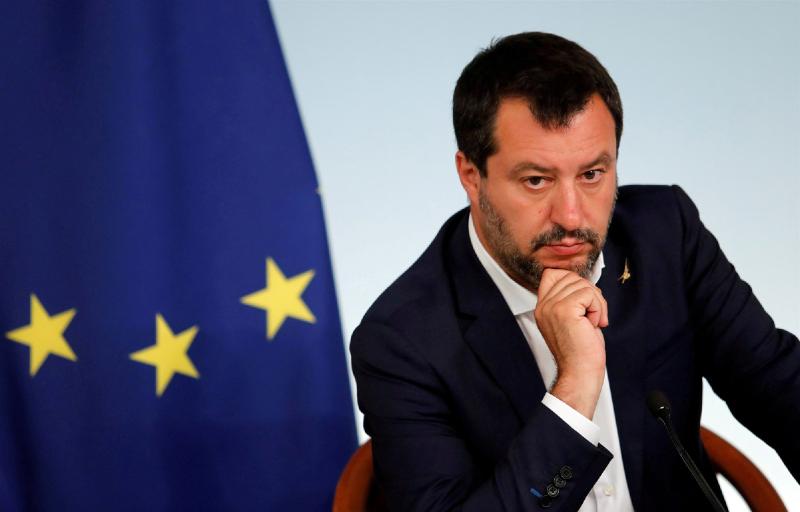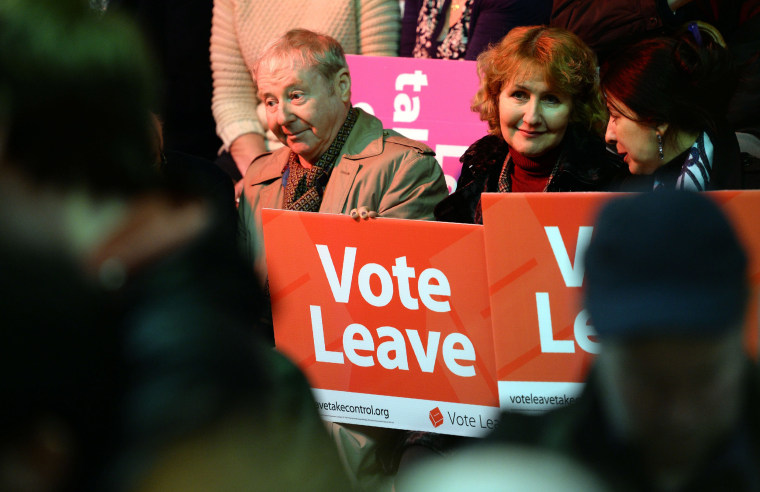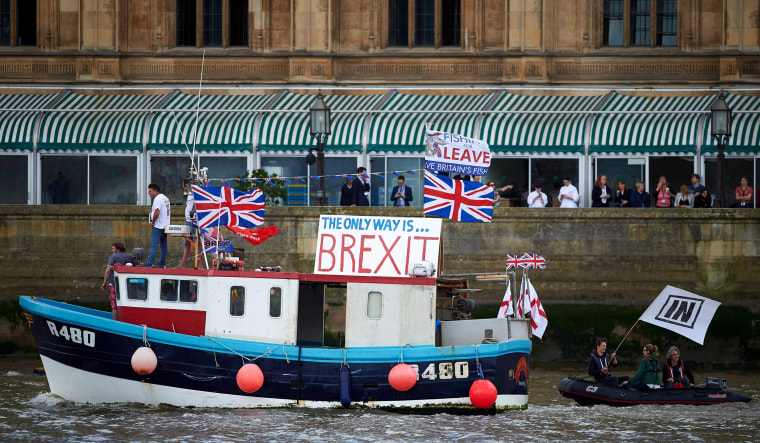Brexit effect? Europe's populists back away from calls to leave the union



LONDON — Brexit was supposed to trigger a domino effect that could spell the beginning of the end of the European Union.
In the days after Britain voted to leave the 28-member bloc in June 2016, euroskeptic parties from across the continent heralded the result as a “victory for freedom” and stepped up their calls for a referendum on their own countries’ membership.
“The U.K. has begun a movement that will not be stopped,” French far-right leader Marine Le Pen said the day after Britain voted to leave, calling for a similar referendum to be held in France.
Populist leaders from Amsterdam to Vienna suggested they would push for their own votes.
But three years on, Britain is yet to leave the bloc and no such wave of countries eager to follow suit has materialized.
Most euroskeptic parties— including those that have since assumed power — have rowed back on their demand for referendums, presenting themselves instead as reformers hoping to transform the bloc from within.
The change in tack comes at a time when the union is more popular than it’s been since a brief interlude between the fall of the Berlin Wall and the 1992 Maastricht Treaty that furthered European integration, according to a European Commission survey.
n April, 61 percent of respondents from across the 27 states other than the United Kingdom said their country’s membership was a good thing, compared to just 53 percent who said so in October 2016.
European Council President Donald Tusk is in “no doubt” that Britain’s bungled attempt to leave has played a vital role in strengthening support for the union across the continent.
“Brexit has been a vaccine against anti-E.U. propaganda and fake news,” he said as he celebrated May’s election results, which delivered a pro-E.U. majority in the European Parliament.
From divorce to reform
Tusk is not alone in his assessment.
Catherine De Vries, a political scientist at the University of Amsterdam, said her research found that as public opinion became more wary of Brexit, parties started to water down their positions on leaving the bloc.
“It’s not to say they’ve abandoned them but they’ve strategically decided not to highlight them,” she said.
De Vries pointed to the performance of Geert Wilders' far-right Party for Freedom in the recent European parliamentary elections as evidence that campaigning on an 'exit' platform these days is risky business.
The Dutch anti-immigrant party was the only one to explicitly push for 'Nexit' ahead of last month’s elections and were punished accordingly at the polls, she said. (It lost all four of its seats.)
“Populists are very good at reading public opinion,” said Agata Gostyńska-Jakubowska, a senior research fellow at the Center for European Reform, a think tank in Brussels.
 Vote Leave campaigners in Manchester, northern England in 2016. Oli Scarff / AFP - Getty Images file
Vote Leave campaigners in Manchester, northern England in 2016. Oli Scarff / AFP - Getty Images fileAfter the U.K., Italy is the E.U. member state with the highest proportion of people who think being in the union is “a bad thing,” according to a 2019 European Commission survey.
Yet even there it appears dismay at the chaos surrounding Brexit has led to a response from the far-right, according to Emiliano Alessandri, a fellow at the German Marshall Fund in Washington D.C.
The leader of the League party, Matteo Salvini, celebrated the Brexit referendum result with a simple message: “THANK YOU, U.K. Now it’s our turn.”
He had also previously called for Italy to withdraw from the euro, the common currency that has been a source of friction between Rome and Brussels.
But since becoming interior minister last year, he has instead emphasized changing the “rules” of the bloc.
“One can change their approach,” he told NBC News last month, when asked if he no longer wanted to pull out of the common currency.
Asked whether the mismanagement of Brexit had influenced his policies, Salvini responded that Italy was “going through a different phase.”
“Our aim in government is to change the rules of the European Union whilst remaining in the union and with the currency they put in our pockets,” he said.
The far-right Sweden Democrats dropped their call to leave the E.U. ahead of last month’s European Parliament elections.
Swedes have become more favorable toward E.U. membership in recent years, according to the country’s Central Bureau of Statistics.
While there is no empirical evidence to link this to Brexit, Åsa Westlund, a lawmaker for the ruling center-left Social Democrats, said there was little else that could explain the uptick.
Brexit has “shown how integrated we are and how complicated it would be to move in another direction,” Westlund said.
Peter Lundgren, a member of the European Parliament for the Sweden Democrats, acknowledged that Brexit chaos was one reason why the party had dropped the idea of leaving the E.U. from its agenda.
“We don’t see it as a responsible thing to throw Sweden out in the same situation,” Lundgren said.
Instead, he said his party was concentrating on reform. If that didn’t work, it would go back to pushing for Swexit, he added, when the outcome of Brexit would hopefully be clear.
"It's wise to wait and see," he said.
 A boat from the 'Fishing for Leave' group that are campaigning to 'leave' the European Union sails by the British Houses of Parliament in 2016. Niklas Halle'n / AFP - Getty Images file
A boat from the 'Fishing for Leave' group that are campaigning to 'leave' the European Union sails by the British Houses of Parliament in 2016. Niklas Halle'n / AFP - Getty Images fileThe "wait and see" approach has also been adopted by the far-right Alternative For Germany and the Danish People’s party.
Having once flirted with the idea of leaving the E.U., they too are now beating the drum of reform.
But a former Danish People’s Party European lawmaker, Anders Vistisen, said ahead of recent European and Danish elections that Brussels did not appear to have taken on board the “warning shot” that was Brexit.
“Brexit is not the illness, it’s the symptom,” he said.
“My prediction is that if you don't take these concerns seriously, the European Union at some point will break."
A short-term 'vaccine?'
Examining the issue through a purely Brexit lens could prove overly simplistic.
“It's kind of got to do with Brexit, but also not,” said Georgina Wright, a senior researcher on the Brexit team at the London-based Institute for Government.
“It's also got to do with how the E.U. has changed.”
Some Europe analysts argued that the rise of euroskeptic parties in the region had emboldened anti-E.U. lawmakers to believe it was possible to change the bloc from within — prompting them to change positions on exiting.
In France the National Rally’s Jordan Bardella, 23, a newly elected European lawmaker, explained the far-right’s decision to backtrack on its calls for a referendum.
“The European context has evolved enormously,” he said earlier this year. “Everywhere in Europe, ‘sovereignist’ parties are coming to power.”
“So we have the opportunity to arrive in force in front of the European Commission and to upturn the table,” he added, referring to the E.U.’s executive body.
Marta Lorimer, a doctoral candidate at the London School of Economics and Political Science, said the idea that Brexit could trigger a domino effect across Europe was flawed to begin with.
“It completely misunderstood the way in which the debate on the European Union in Britain is quite different from what it is in the rest of Europe,” she said.
Europeans have generally felt more affinity with the continent’s identity and institutions than Brits have, while Lorimer said a waning focus on issues that once dominated headlines around the world — from the migrant crisis to Eurozone economic struggles — may also explain why some Europeans are feeling more upbeat.
“The things that were happening that made the E.U. look particularly bad are no longer there,” she said.
“Brexit is one part of the story.”
Even if Britain’s messy divorce is partly responsible for endearing the union to some Europeans and convincing some euroskeptic parties to delay or abandon their own efforts to leave, it is unclear how long this will last.
De Vries, of the University of Amsterdam, warned that it was only a short-term fix for the E.U. establishment.
“Not wanting to leave is not the same as being happy,” she said.
“For the E.U. to secure legitimacy, it cannot just live off the fact that Brexit is not a success.”
Saphora Smith reported from London; Claudio Lavanga from Rome; Andy Eckardt and Carlo Angerer from Mainz, Germany.





So what is your take on this? Has Brexit brought Europe closer together, or just the beginning of more troubles?
I think the attempted "Brexit" has clarified for many on this side of the pond that were toying with their own "exit" how interrelated their countries, and economies are. Is it a panacea, not by a long shot when you have economies that are as bad as Greece, and Italy involved. Those would be a couple of the "taker" nations that piss the likes of Finland and Sweden off. They do need to reorganize things in the EU, but together they are a much more effective bulwark against China led APAC region.
With any luck we are seeing the last throws of nationalism across the world. We've seen the rise of the strong man in China, North Korea, Russia, and the U.S., and the damage that it does to democracy of late. In 2020 we'll know if that movement is on the downtrend as it is in the UK.
Brexit was supposed to trigger a domino effect that could spell the beginning of the end of the European Union.
I haven't heard of the Domino Effect since the late fifties, early sixties, other than a reason for going to war it never materialized then as it will not this time.
Has Brexit shifted the European Union to become more liberal or more conservative? The idea that Brexit would result in a domino departure of other countries seems premised upon the EU political environment remaining static. I don't believe that is the case.
My perspective is that Brexit has forced the European Union to evaluate its priorities and make adjustments to prevent a domino effect.